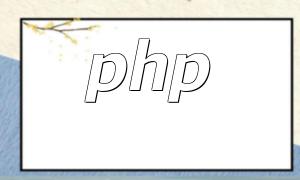When selecting a PHP framework, usability is a key consideration. A user-friendly framework can improve development efficiency, shorten project timelines, and reduce maintenance effort. Here is an analysis of the usability of several popular PHP frameworks:
Laravel is known for its elegant syntax, rich features, and active community. Its ecosystem includes:
CodeIgniter is a lightweight and efficient framework, suitable for small to medium projects. Its advantages include:
Symfony is a component-based framework that offers a wide range of libraries and tools, suitable for various web development needs:
Suppose you need to develop a PHP website with user registration and authentication. Here are implementation examples using Laravel and CodeIgniter:
// Routes
Route::post('/register', 'RegisterController@register');
// Controller
class RegisterController extends Controller
{
public function register(Request $request)
{
$user = new User();
$user->name = $request->input('name');
$user->email = $request->input('email');
$user->password = Hash::make($request->input('password'));
$user->save();
return redirect()->route('home');
}
}
// Model
class User extends Model
{
protected $fillable = ['name', 'email', 'password'];
}// Configuration
$config['user_activation'] = TRUE;
// Controller
class Register extends CI_Controller
{
public function index()
{
$this->load->helper('form');
$this->load->library('form_validation');
$this->form_validation->set_rules('name', 'Name', 'required');
$this->form_validation->set_rules('email', 'Email', 'required|valid_email|is_unique[users.email]');
$this->form_validation->set_rules('password', 'Password', 'required');
$this->form_validation->set_rules('passconf', 'Password Confirmation', 'required|matches[password]');
if ($this->form_validation->run() === FALSE) {
$this->load->view('register_view');
} else {
$data = array(
'name' => $this->input->post('name'),
'email' => $this->input->post('email'),
'password' => $this->input->post('password')
);
$this->user_model->register($data);
}
}
}
// Model
class User_model extends CI_Model
{
public function register($data)
{
$this->db->insert('users', $data);
}
}Depending on project requirements and developer preferences, Laravel, CodeIgniter, and Symfony are all user-friendly and powerful frameworks. Laravel is ideal for projects seeking modern development experience and a rich ecosystem; CodeIgniter is lightweight and efficient, suitable for smaller applications; Symfony excels in large-scale, highly extensible projects. Choosing the right framework can significantly improve development efficiency and ease of maintenance.









